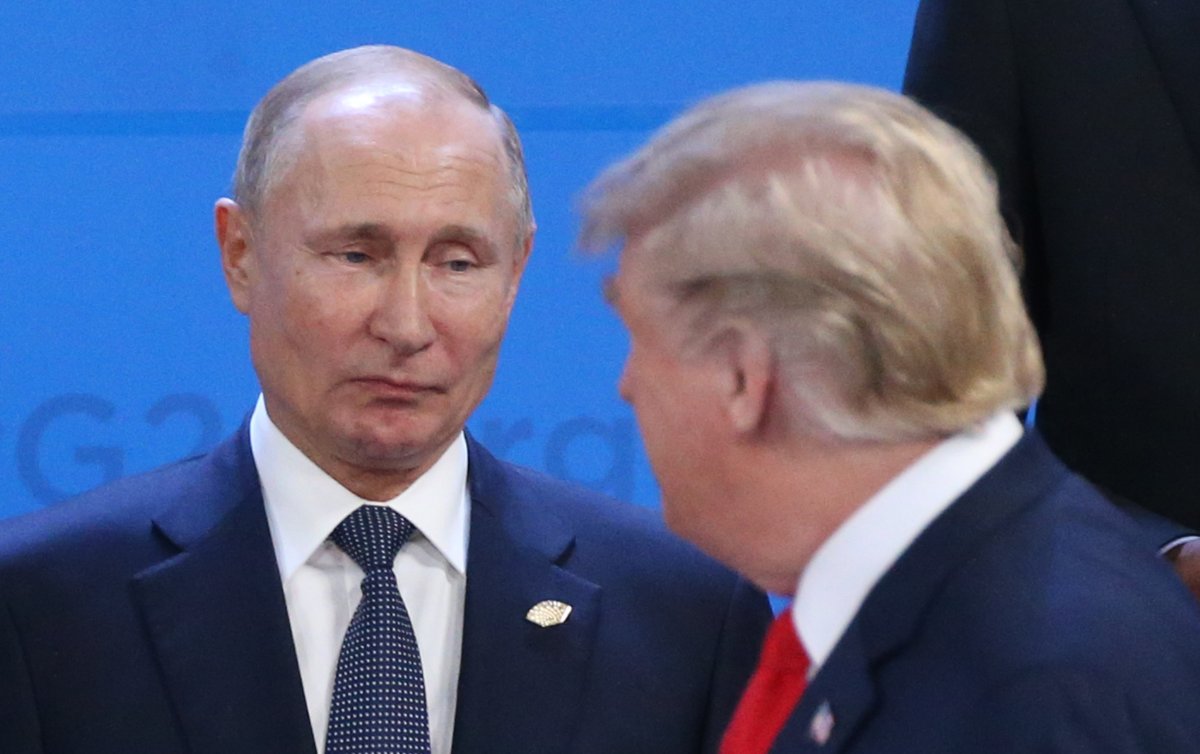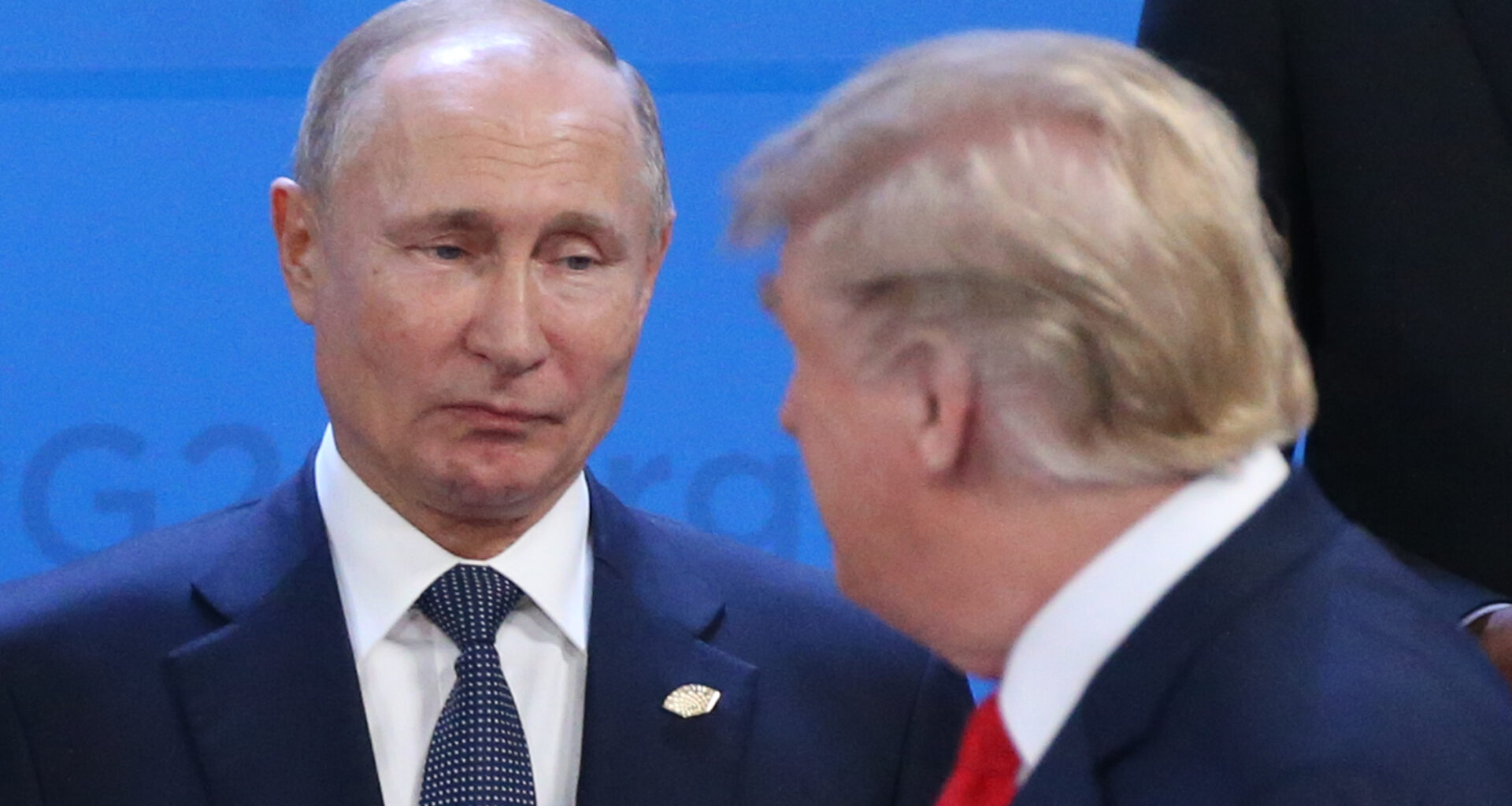A Russian newspaper branded Donald Trump the “President of War” following a U.S. military operation against Iranian nuclear facilities over the weekend.
U.S. bombers deployed 30,000-pound “bunker busters” on Iran’s underground nuclear facilities, ending days of speculation over whether Trump would authorize direct military intervention for his objective to put “a stop to the nuclear threat posed by the world’s No. 1 state sponsor of terror.”
The developments were published by several state-owned and independent Russian newspapers, including Rossiskaya Gazeta, Komsomolskaya Gazeta, Nezavisimaya Gazeta, Moskovsky Komsomolets and Kommersant, according to BBC‘s Russia editor, Steve Rosenberg.

Russian President Vladimir Putin (left) looks at U.S. President Donald Trump during the welcoming ceremony prior to the G20 Summit’s Plenary Meeting on November 30, 2018, in Buenos Aires, Argentina.
Russian President Vladimir Putin (left) looks at U.S. President Donald Trump during the welcoming ceremony prior to the G20 Summit’s Plenary Meeting on November 30, 2018, in Buenos Aires, Argentina.
Mikhail Svetlov/Getty Images
Why It Matters
The U.S. attack on Iran’s nuclear infrastructure has far-reaching impact for American security interests, global energy markets and the volatile Middle East region. Israel and Iran are waging direct hostilities, with hundreds killed as both sides launch missiles.
The intervention by Washington could define regional stability for years, test U.S. alliances in Europe and the Gulf, and set dangerous precedents over nuclear nonproliferation enforcement. Congressional leaders and protesters nationwide have warned of the risk of a third U.S. war in the Middle East this century.
Russian President Vladimir Putin described the strikes as “unprovoked aggression,” and coverage in major Russian outlets questioned the long-term fallout for global stability and Russia’s regional interests.
What To Know
Over the weekend, the U.S. launched strikes against three Iranian nuclear sites—Fordow, Natanz and Isfahan—using “bunker-buster” bombs weighing up to 30,000 pounds. The attack, dubbed Iran Operation Midnight Hammer, involved more than 125 U.S. military aircraft.
Putin on Monday condemned the U.S. strikes as “an absolutely unprovoked act of aggression against Iran.”
“It has no basis or justification,” Putin said, according to Kremlin newswire Tass.
Putin made the comments during a meeting with Iranian Foreign Minister Abbas Araghchi, adding that Russia was “making efforts to provide assistance to the Iranian people.”
Nezavisimaya Gazeta ran a front-page headline that read: “Trump has become the president of war” and said the strikes marked a fundamental shift in U.S. foreign policy.
Trump “violated his election promise to be the president of peace, not war,” the newspaper said.
“For the Russian Federation, such a transformation in the White House policy does not bode well. It may mark the end of Trump’s peacekeeping efforts in the Russian-Ukrainian [war],” the newspaper added.
Rossiskaya Gazeta, a state-run publication, mocked Trump’s campaign slogan with the headline: “Trump Makes America Wage War Again.”
Komsomolskaya Pravda questioned what the attack meant for Russia, quoting a Middle East expert who said: “If this [Iranian regime change] happens, we [Russia] would lose a partner, the Islamic Republic, and be left with a new center of instability affecting not only the Middle East, but also Central Asia and the South Caucasus, regions which are very sensitive for us.”
Trump floated the possibility of “regime change” in Iran in a post on his Truth Social platform on Sunday night, writing: “It’s not politically correct to use the term, ‘Regime Change,’ but if the current Iranian Regime is unable to MAKE IRAN GREAT AGAIN, why wouldn’t there be a Regime change??? MIGA!!!”
Moskovsky Komsomolets warned of possible economic repercussions, asking: “The Americans committed aggression against Iran after all…Will war raise the price of oil to $200 a barrel?”
That’s possible because Iran has warned that it could shut the Strait of Hormuz, one of the world’s most critical oil transit chokepoints, in retaliation for U.S. involvement in its conflict with Israel.
The Strait of Hormuz is a narrow waterway connecting the Persian Gulf to the Gulf of Oman and the Arabian Sea which handles around 26 percent of global oil trade, making it one of the most strategically important maritime passages in the world.
The International Energy Agency notes that any disruption to flows through the strait would have significant consequences for world oil markets.
Meanwhile, Kommersant ran a headline with a hint of skepticism: “The U.S. carried out a strike on Iran in order to ‘end this war…’.”
What People Are Saying
Kremlin press secretary Dmitry Peskov, on Monday on the situation in the Middle East possibly interfering with dialogue between Russia and the United States: “These are different areas. We have our partnership relations, a strategic partnership with Iran, but we are also working on restoring our relations with the United States. Both are very important areas.
“And our dialogue with the Americans also depends, so to speak, on the possibility of reaching a settlement in many other areas. Therefore, it is unlikely that anything will interfere, one will interfere with the other.”
What Happens Next
Iran has repeatedly threatened retaliation for the U.S. strikes. The full extent of the attacks is not yet clear, but Trump claimed Sunday that “the hits were hard and accurate” and “obliterated” Iran’s nuclear infrastructure.
